1038. Preaching the Gospel in Africa Before the Priesthood Revelation By Maurine Proctor · May 30, 2018, Story of Brother Johnson!
This is one of the most amazing true stories I have read, of faith and hope, and patience!
Preaching the Gospel in Africa Before the Priesthood Revelation
Sign up for Meridian’s Free Newsletter, please CLICK HERE
Leading up to the June 1st LDS Church commemoration of the 40th anniversary of the Revelation on the Priesthood, Meridian Magazine has been featuring a series of articles celebrating the event. These have included profiles of the people deeply affected as well as a behind-the-scenes look at how this revelation came to be.
Here is the latest profile of a truly remarkable man who brought the Gospel to Ghana in an unbelievable way. Though Brother Johnson passed away in 2012, the following was taken from an interview Meridian Magazine conducted with him in 2004, near the time of the Accra Ghana Temple dedication.
A World We Don’t Know
Driving down the road from Accra to Cape Coast, we are able to have our first glimpse of the village life most people in Ghana know. Markets are crowded with people and goats, squat houses are a monochromatic brown, and signs on the businesses are surprising. They say “God Works Miracles Beauty Salon,” “Jesus Loves Me Jewelry,” even “God is Love Meat Market.”
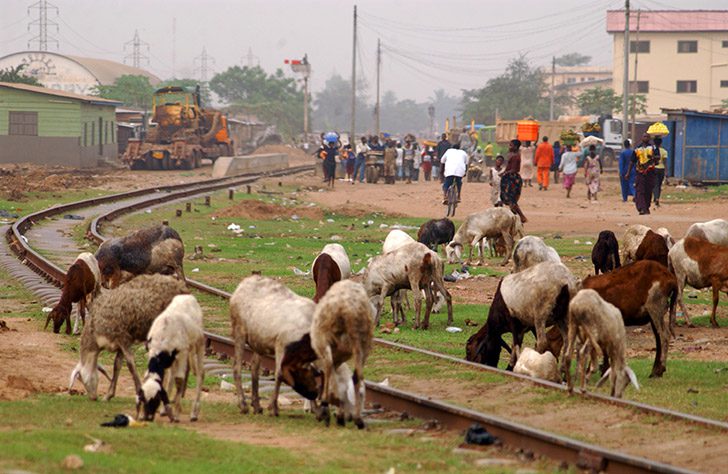
Christianity here is overt. Everyone who has been to school knows the Bible. Abigail, a vendor in the craft market where we buy a nativity set, can discuss with some sophistication theories on when the wise men came. Kofi Opare, a former bishop, who has volunteered to drive us tells us that life is so hard here, people need God. They take their troubles to him.

A friend observes that he finds it ironic that materially Europe has everything, but has abandoned God, while the Ghanaians have nothing, yet their faith is vibrant.
So in some ways it might be easy to dismiss the Church’s phenomenal beginnings here as just one more expression of a desperate people’s longing for God. That would be the sociologist’s explanation.
Our experience here defies that theory. You can’t meet the Latter-day Saints in Ghana and not be forever transformed with their spiritual power and understanding; feeling that somehow you have been transported to a new world where the veil is thinner, the air clearer, the Spirit a constant stream of light.
The beginnings of that tie to Joseph William Billy Johnson.
A Man Called by God
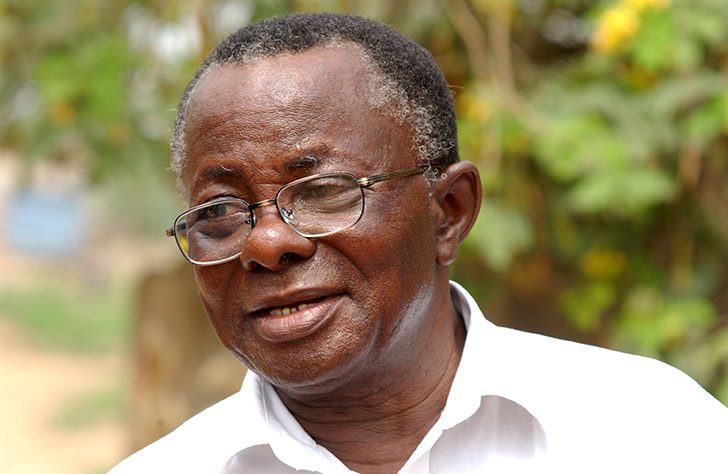
Without priesthood power and direction, without the authorization of the Church, with no hope of receiving the priesthood himself, with no hope for temple blessings, he still felt compelled—even fired from his bone marrow– to preach the gospel of Jesus Christ. Persecutions didn’t stop him. Disdain only sent him to his knees. The slow grinding of the years when he had ten congregations each bearing the handwritten signs “The Church of Jesus Christ of Latter-day Saints” didn’t wear him down. Official letters from Church headquarters telling him that it wasn’t yet time to send missionaries didn’t daunt him. He knew from personal revelation that his “brothers from the West” would come for him, and though he sometimes cried and often prayed all night for courage, when they did come, he had 1,000 people who were ready for baptism.
How is it that some people overcome the drags of mortality and burst with such light upon the world? And how was it that a legend, the pioneer of a whole nation could still be living to see the fruits of his labors at a temple dedication?
In the early 60’s, the Lord’s Spirit certainly began brooding on Africa. Not only did Brother Johnson form his congregations in Ghana, but also in Nigeria unauthorized congregations of Latter-day Saints began sprouting. Here it was that somebody saw an advertisement in The Reader’s Digest, there a friend from Europe sent a tract. Somebody else received a copy of the Book of Mormon. Seemingly unrelated events were coming together to bring a groundswell of interest in what must have seemed like a distant Church. What wasn’t distant was the Spirit which moved upon many people almost simultaneously with a divine orchestration that would someday bring a temple.

On that drive to Cape Coast, when we came upon Brother Johnson’s neighborhood, nothing seemed remarkable. His home was in a typical African village, but that is where “typical” ended. He was as astounding as you’d expect the founder of a movement against great odds would be, and we felt the impress of his grand spirit as we interviewed him. Had we met someone like this before—ever before? Could Parley P. Pratt have been more on fire than this African patriarch who had begged for the Church? We were not surprised when we learned that some of the early missionaries called him the “St. Paul of Ghana.”
His face was boyish, his tears barely restrained as he told us his story. Brother Johnson is a visionary man, a man with significant dreams. God speaks to most of us in quieter tones, yet perhaps on the frontier of the Church, Joseph Johnson needed dreams to sustain and teach him.
Early History of Joseph William Billy Johnson
Brother Johnson was first introduced to the Church in 1964 by Dr. A.F. Mensah, who had received books and tracts from a non-member friend in Ireland and was trying to establish the Church in Ghana without much success. He wanted help from Brother Johnson who came away from their meeting with copies of the Book of Mormon, the Pearl of Great Price, the Doctrine and Covenants, the Articles of Faith, and some pamphlets.
He started his studies by reading a tract on Joseph Smith and the first vision, and said he, “I was convinced. I believed. I felt the spirit when I read the story of Joseph Smith, especially how the father and the son revealed themselves to him. That moved me a great deal.”
He took his studies of the Book of Mormon with equal conviction, poring over the pages. Then, he said, “One early morning of March 1964 while I was about to get up to prepare for my daily chores, the Spirit of the Lord fell upon me. I heard a voice from heaven speaking to me saying, ‘Johnson, if you will take up my word as I will command you to your people, I will bless you and bless your land.’ Trembling in fear, I replied in tears, saying ‘Lord by thy own help, I will do whatsoever thou would command me.’
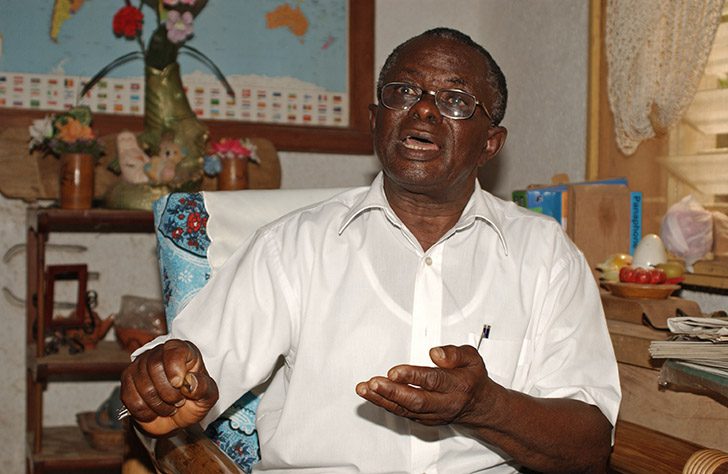
“From that day on,” said Brother Johnson, “the Spirit of the Lord constrained me to propagate the restored gospel to my people. I started door to door and performed open missionary work preaching the new message we read from the Book of Mormon.”
Unending Challenges and Trials
As soon as he started to do this work, persecution was heaped upon him. From a distance, we might have assumed that the Church flourished as it did because the Africans were easy and receptive, able quickly to cling on to the good news of the gospel.
That wasn’t so. It was the same story that had been replayed in England and Denmark more than 100 years before. The gospel is introduced and all hell breaks loose.
“We were ridiculed and heckled by mobs who did not believe the Book of Mormon and the testimonies of Joseph Smith. They believed only the Bible and they would not accept any other book of scripture as the word of God. A lot of Churches took notice of us and started calling us names. They branded our group as an anti-Christ organization.”
Remember, at this point in 1964, Brother Johnson has not been called on a mission by the Church. No mortal has asked him to preach the gospel. He is devoting full time to a calling that he feels only within himself. He has a message that includes exclusion of the priesthood, limitation to blessings, and no church to attend.
This can’t be readily appealing. What keeps him going? He is harangued by day, but taught by night. With enormous spiritual hunger, he calls upon the Lord who continually answers through his Spirit, “Here am I.”
He preached the Book of Mormon and people answered that they had read the Bible. They told him that it is the only book. He explained that the 66 books of the Bible were not all written at the same time. He reminded them that Christ had said he had other sheep. And he kept plodding along, crying to the Lord for more.
One time after he had been fasting for three days, he dreamed of walking on a plain and he looked ahead and saw two enormously heavy books. He was told, “Johnson, go carry them. Go carry them. Go carry them.” It seemed impossible to him, but he followed the instruction, picked them both up and found the books were light. “They were light,” he said, “because they supported each other. Once I saw it in a vision, I didn’t doubt any more.”
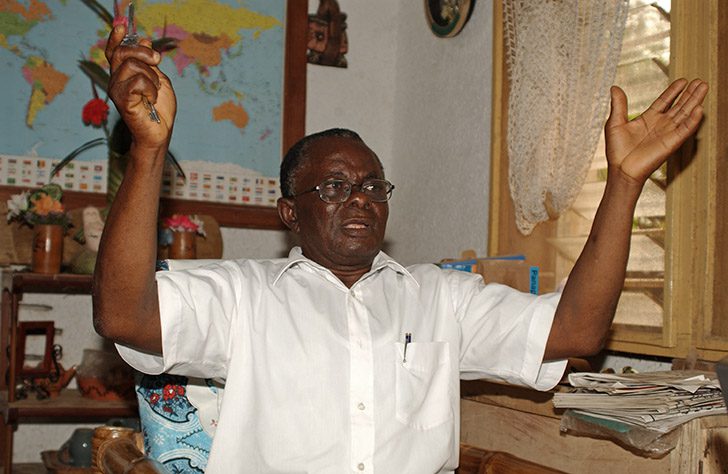
Brother Johnson said, “Persecution became bitter, so much that we nearly gave up from the very onset, but through much prayer and fasting, we waxed strong in faith and continued to preach the gospel without flinching.”
One day at Accra Post Office Square, a religious group suddenly broke up the meeting by distributing anti-Mormon pamphlets. “They thought they could discourage us, but we were undaunted. We persisted and won the hearts of 40 people that day.”
Pleading for Direction from the Church
Won them for what? Mere scraps of information, but nothing they could model. Brother Johnson or a member of his group wrote letters to the Church, and they received kind letters of encouragement, magazines, a hymnbook and instructions about how to run a meeting. First, have an opening song. Next an opening prayer. The correspondence was continuous through the years. The plea was “Come for us.” The response, “We want to. The time is not yet.”
Brother Johnson persisted. Their church group met in a school owned by the Anglican Church who finally decided that the rate of growth of Johnson’s group was a threat to their own. The LDS group was asked to leave.
They moved their meetings to a storeroom in Brother Johnson’s house. The group outgrew it. They registered with the government. They started a primary school called the Brigham Young Educational Institute. Brother Johnson named his son Brigham. He was not a bishop so they called him the Reverend Minister Johnson. They hung on, sometimes with tears, but they hung on.
In 1969, Brother Johnson moved to Cape Coast where he established what became 10 separate congregations in the little villages that dotted the area. Their meeting houses with the odd little signs that announced themselves as The Church of Jesus Christ of Latter-day Saints were a motley group. The Cape Coast group met in a converted old cement warehouse. The front wall had a large painting of Christ and at the back of the podium a finely grafted and polished statue of the Angel Moroni. The tin roof leaked when it rained and Brother Johnson spent much time trying to get a government permit to fix it. Attached to the pulpit was a picture of the Bible and the Book of Mormon and the room was decorated with the pictures of Joseph Smith, the Tabernacle Choir, and other LDS scenes. The Assin Fosu Branch met in a room of the village school building. Sekindi-Takoradi Branch met in the restaurant of the ‘branch president.’
They had high hopes to be baptized members of the Church, but the years were long. Elder Emmanuel Kissi wrote in an unpublished manuscript. “In connivance with State Security snares were set to entrap Johnson. In 1977 he was approached by no less than four denominations who tried to influence Johnson’s Church ‘with large sums of money to cause a change of our name to theirs’…In each case they knew that Mr. Johnson’s church could not have been recognized by the Church in Salt Lake because of the Church’s position in regard to the priesthood and the Negro. In each case Mr. Johnson was approached by these churches telling him that the Church in Salt Lake would never recognize his congregation and that he might just as well give up hope and come and join their ranks. [One group] offered Mr. Johnson a scholarship in theology and a full time salaried position as a minister in their church. They also offered to contribute $10,000 towards the purchase of some improved facilities and equipment.
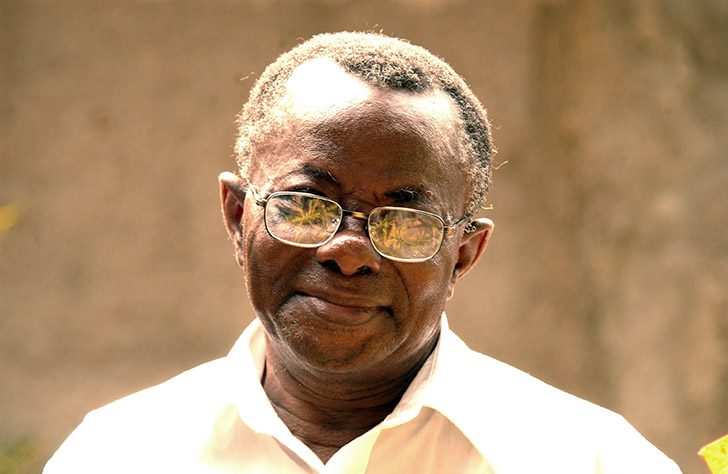
“The contingent which included a bishop, stayed in Mr. Johnson’s home for about one week. Towards the end of the week Johnson ‘decided to pray and ask the Lord to confirm that this is what he should do.’ During his supplication he heard a voice tell him, ‘Do not confuse my people,’…He immediately got up from his knees and went into his living room where at the same time the bishop of the aforementioned church also came into the living room and before Johnson could say anything himself, the bishop said that the Lord had just revealed to him that he should not persuade Mr. Johnson and his congregation to depart from their own church.”
Despite prayers answered and heavenly manifestations, sometimes Brother Johnson was discouraged. Elder Kissi wrote, “Whilst in anxious prayer one of those days, Johnson heard an unidentifiable voice…saying to him, “I will come and help you. Do not be discouraged. Be patient. The Church in America will help you.”
The Revelation Finally Came
Then on June 9th, 1978, Brother Johnson had difficulty sleeping, so he listened to the radio, a radio that had not been working very well of late. During the midnight broadcast of the BBC, he heard the news that the Church was going to extend the priesthood to all worthy males. The floodgates were opened. The blessings that Brother Johnson had sought for so long would now be available. He “sat there and cried.”
At a Regional Representatives seminar that year, President Spencer W. Kimball, who had prayed so long for this revelation on the priesthood said, “We have an obligation, a duty, a divine commission to preach the gospel to every nation and every creature…We feel that the Spirit of the Lord is brooding over the nations to prepare the way for the preaching of the gospel. Certain political events have a bearing upon the spreading of the truth, and it seems as though the Lord is moving upon the affairs of men and nations to hasten their day of readiness when leaders will permit the elect among them to receive the gospel of Jesus Christ…And what about Africa? They have waited so long already…Are they not included in the Lord’s invitation to ‘teach all nations?’ Are they not included in the utmost part of the earth?’”

At that same meeting President Kimball read a letter from Brother Johnson, “We therefore solemnly declare in the name of Jesus Christ that God has prepared the groups in Ghana for you, and we have nowhere else to go but forward, looking for your missionaries to help us understand the Church better.
It is our burning desire to live by that faith and attain its standards.”
On the day of the Ghana temple dedication, Brother Johnson said, “We will always remember what the missionaries have done for us. My heart is burning with love and appreciation. When I started preaching with the Book of Mormon, everyone said, they won’t come. Leave the Church. I said, ‘I know they will come because the Lord has told me.’”
The First Missionaries Arrive in Ghana
When the first two couples Rendell and Rachel Mabey and Ted and Janath Cannon came to Ghana, the land was in a drought, conveniences were hard to come by and food was difficult to obtain. Brother Johnson said, “I remember Elder Cannon had a characteristic movement. He was always pulling up his pants because he had lost so much weight.”
It was a rainy day in Cape Coast when the missionaries came. Since the roof was so full of holes “we could look through the ceiling and see the birds,” the rain poured through and everyone was wet. Still, nobody moved, so intent were they on hearing the gospel. “We were sitting in the room wet, and we were listening to the missionaries. They would explain things to us, and ask if we believed. We nodded, saying, ‘We believe. We love the Church. We love it. It is close to our hearts.’”
They had been taught through the Spirit, and they knew.
Some things needed to be corrected. They had not ever seen an LDS Church service so they had incorporated ideas they had seen in other churches. They had a collection plate, they used drums in their worship, they had interpreted the Word of Wisdom to mean that they could eat wheat but not oats. They changed as soon as they understood, including something that could have been sticky.
Pure Faith
As in other churches, Brother Johnson had been receiving a modest living through collections, an idea that certainly must have seemed reasonable since he poured endless hours into the work each week. Now, as he came to understand the concept of a lay ministry, he would have to give up his means of living, yet still put in the same hours as first a branch president and then later a district president. Elder Mabey asked him how he would survive if the Lord called him to this position. To this he replied, “I have been thinking about that, and I am sure the Lord will not call me without providing a way.”
He and his brother had decided to acquire a farm to raise fruits, vegetables and keep chickens. “We hope,” he said “to develop a model kind of farming program which others may follow. We intend, in fact, to give all our surplus to the Church.”

The Church grew like a brushfire in Ghana with Brother Johnson playing a key role and guided by inspiration. Elder Reed and Sister Naomi Clegg wrote about how Brother Johnson found strong, committed leaders and followers. They said, “He would go into a new village and ferret out a prospective leader of the Church there. That person might be the principal of a school…or the postmaster or other village leader. Johnson would tutor that prospect in gospel principles and doctrine until he became converted. If the prospect proved difficult to convince President Johnson would take him into his abode and spend almost night and day with the novitiate. Then he would demonstrate Church leadership by going with the convert to establish branches. President Johnson would then go back to the new member’s village and help him convert his fellow villagers and organize a Church group. We witnessed and participated in that procedure several times.”
The Freeze
In 1989 when a military government in Ghana froze the activities of the Church for 18 months, President Johnson was not dimmed. “The freeze was a blessing,” he said. “At that time, people were so curious about the Church they started asking for pamphlets. Families became strong as they held sacrament meetings in their own homes. Father was presiding. Mother was the Relief Society president. Daughters were the counselors.
“Because we have the truth, the police were even on our side. The police cars would come and pick me up and I gave a service for them every Friday morning.” President Johnson was allowed to give services in prison. Everyone was longing to hear more about the Church. They told President Johnson, ‘We want to feel that something is precious.’”
“When we came back together after the freeze,” he said, “we came back in strength.
“They thought we would scatter, but we came back in strength. Teach them correct principles and they will govern themselves.”

President Johnson said that the Church is highly respected in Ghana. “They know that Mormons are upright. They like the way we care for our people. We visit our people. We care for every member. We take care of the needy. Other churches are trying to practice home teaching and visiting teaching because they like it.
“One of our members took a non-member friend to a place where marriage disputes are settled. They told her, “Go and see your bishop. They can do it better. He has the key we don’t have it.”
Rejoicing in the Day of Salvation
So the day of the temple dedication, President Johnson had “shining tears of joy.”
One night, before the Church had come, he had been weeping for a different reason. He was discouraged and pained, wondering, “Will our brothers from the West ever come for us?” Then in a dream his brother, who had died four years before President Johnson had found the Church came to him and said, “Do not weep. I have found your Church in this place, and I want to be baptized, but I cannot without your help.” To prove to President Johnson that he spoke the truth he sang for him “Come, Come Ye Saints.”
President Johnson , “Temple work is the sweetest part of the Church to which my heart and soul have always clung. I want to meet my mother and father in the resurrection prepared to enter the kingdom of God.
“There is a chorus of God’s love inside every member of the Church today. We can’t express our gratitude for the blessings we have received.”



Comments